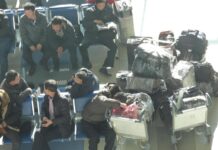As a peninsula surrounded by the sea on three sides, Korea has easy access to a wide variety of seafood. Seafood is nutritionally excellent, both as a major source of animal protein and as a rich source of healthful ingredients, including omega-3 fatty acids, vitamins, minerals and antioxidants. For these reasons, countries around the world include seafood as a key element of a healthy diet and continue to recommend its consumption for its health benefits.
When I recently asked a resident of Chagang Province how much seafood costs in his local markets, I was shocked to learn that he did not know the price of seafood – not even such Korean favorites as pollock, mackerel, octopus and squid.
I teased him about his ignorance of market prices, only to receive the sobering reply that “eating seafood is a luxury these days.” He added that he used to eat seafood once or twice a month before the pandemic, but now he is lucky to get a glimpse of it on major holidays such as Chuseok and Chungmyung Day (when people conduct ceremonial rites for departed ancestors).
Seafood is an important source of omega-3 fatty acids such as EPA and DHA, which are beneficial for our cardiovascular health. Without seafood in our diets, we lose access to these nutrients, potentially increasing our risk of developing cardiovascular disease in the future.
According to the World Health Organization’s Noncommunicable Diseases Data Portal, 80% of deaths in North Korea in 2019 were due to noncommunicable diseases, and 40% of those were due to cardiovascular diseases. This is significantly higher than deaths from cancer (16%) and chronic respiratory diseases (13%).
North Korean doctors report that cardiovascular diseases replaced infectious diseases as the leading cause of death in the country in the 1990s. They acknowledge that the lack of seafood and red meat in the North Korean diet affects people’s health.
According to North Korea’s internal records, the country’s fishing industry caught 1,967,000 tons of seafood in 1981, the largest catch on record. But by 2023, that catch had dropped to 400,000 tons.
Assuming a North Korean population of 25 million, that’s only enough seafood, if evenly distributed, to give each person 16 kilograms.
For reference, South Korea’s annual per capita seafood consumption is 68 kilograms (as of 2018, according to an OECD report on seafood). This is the highest in the world, and four times higher than our estimate of North Korean seafood consumption.
More troubling is the fact that, given the structure of North Korean society, the elite and coastal residents probably have decent access to seafood, but people in the interior are forced to consider seafood a luxury. How ironic that seafood consumption could become a luxury in a peninsular country with the boats and nets needed to catch fish!
What could have caused such a situation? Simply put, the culprits are an inflexible supply system, a poor distribution network, and the government’s oppressive grip on the market.
Considering that markets developed after the government stopped rationing during the economic turmoil of the 1990s, vibrant markets alone should be enough to smooth the way for seafood supply and consumption. At the very least, this would prevent seafood consumption from becoming a luxury.
The North Korean authorities need to recognize that ensuring market independence and establishing more flexible systems are critical to ensuring the survival of citizens and improving their quality of life, and they need to take meaningful steps to implement change.
Translated by David Black. Edited by Robert Lauler.
Daily NK works with a network of sources living in North Korea, China, and elsewhere. Their identities remain anonymous for security reasons. For more information about Daily NK’s network of reporting partners and information-gathering activities, please visit our FAQ page here.
Please send any comments or questions about this article to dailynkenglish@uni-media.net.


















